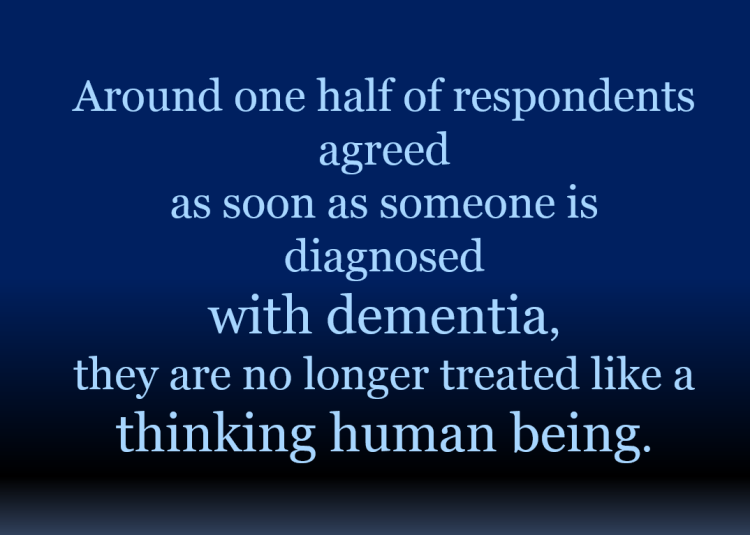I had posted a great article on my Google+ account about a woman who shares her story of actively LIVING with dementia. She wrote books, she gave talks, she even remarried! You can read the article here, and her webpage here. And I highly recommend it.
One of the points she makes in the article is about making it better for people who are diagnosed. She doesn’t necessarily mean making their prognosis better, but how they are accepted into society and respected a humans.
‘I’m really passionate about trying to make it better for other people being diagnosed today,’ she said.
‘I want people to feel brave and I want society to accept us as disabled people amongst us who deserve dignity and respect, not to be shunned and laughed at.
‘There are so many jokes out there about old timers disease and “I’m losing my marbles”. It’s so hurtful. people don’t realise that it’s like saying “I’ve got a touch of cancer today”. It’s a terminal illness that people joke about.’
This really resonated with me. I get frustrated when I hear people comment that “they are old, so they forget a lot,” or that they have “part-timers,” “old-timers,” or another handy phrase to make a joke about their momentary lapse in memory. I am uncomfortable calling them out to their face and saying, “hey, that’s incorrect and offensive.” Sometimes I will say that I work with dementia, but about half the time this is welcomed with, “so you know what I mean, then!” However, I find that if I talk about young-onset dementia, I see a change in people’s faces, when they realize it really isn’t just for “old people” and that it is, in fact, a very serious syndrome.
For people with dementia, it’s every day. They have dementia every single day, and in every single place they go. It’s not a matter of incorrectly counting change once in a while, or forgetting your silverware with lunch one day. Dementia is different from normal age-related memory changes (which do exist, as the brain has more information to search through to recall previously stored information), because the brain is working and aging in a different way than a healthy brain. When people are making fun of dementia, it’s really not funny.
I remember when I was an intern at the World Health Organization in Copenhagen, one of the ladies ahead of me in the lunch line asked me to pass her some silverware that she forgot to pick up, saying “I’m old, you don’t understand yet, but you forget things when you’re old.” She was in her 50s (which is over a decade away from the definition of old). And probably didn’t know that I have a degree in Aging Studies (Gerontology). Or that I was an intern in the Age-Friendly Cities program and was currently writing my PhD on dementia care. But, the point is, she shouldn’t have to know that stuff to realize what she was saying was incorrect, perpetuating stigma about aging, and making folly of dementia.
If we take a little time to think about what we are saying when we talk about memory or dementia or people who we think are “old,” we gain some insight into how we really feel about those topics. We also get a moment to consider if it is respectful and accurate, or if it’s something best left in our thoughts.
55.676097
12.568337
Like this:
Like Loading...



